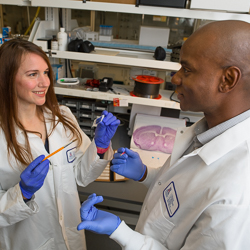
Graduate Student Awarded Scholarship

A graduate student at the University of Arizona College of Medicine – Phoenix has been awarded a scholarship for her work linking stress to anxiety and depression.
Tanessa Call, a graduate student in the laboratory of Deveroux Ferguson, PhD, was selected to receive the Harry Lowell Swift Advancing Health Care Scholarship. Call is working towards her PhD in neuroscience at Arizona State University.

This scholarship is awarded to graduate students who are advancing health through biomedical or biotechnological research.
“This is an amazing accomplishment,” said Dr. Ferguson, an assistant professor in the college’s Department of Basic Medical Sciences. “Graduate students bring fresh ideas and provide a new look on old concepts, helping to progress research. It is wonderful that the research conducted by graduate students can be recognized in such an honorable way and surely inspires and motivates their progress.”
Call’s interest in neuroscience and depression began in an undergraduate abnormal psychology course. Her first research experience was studying schizophrenia in the laboratory of Ron Hammer, PhD, a professor in the department of Basic Medical Sciences. She volunteered in Dr. Hammer’s lab for two years before joining Dr. Ferguson’s lab in 2014.
“Tanessa has been a valuable member of my laboratory from the very beginning,” Dr. Ferguson said. “I have had the honor of watching her progress and grow in her understanding of techniques and some quite complicated concepts involved in our research. She is a wonderful mentor to our volunteers and is always happy to teach others what she has learned. She is passionate about this research and this is obvious when listening to her talk about it with others and her dedication to her research projects.”
Dr. Ferguson’s laboratory researches the effects of stress on the development of anxiety and depressive-like illnesses. They have discovered that a specific protein, sirtuin 1 (SIRT1), is elevated following a chronic social defeat stress model. This elevation occurs in a brain region called the nucleus accumbens, a major reward processing center in the brain. Interestingly, this protein is only increased in a subset of chronically stressed animals, dividing the groups into stress “susceptible” and stress “resilient.” Call’s thesis work aims to elucidate physiological and morphological changes that occur following the manipulation of SIRT1.
“My passion for researching mental illness, specifically depression, stems from the fact that these illnesses hit close to home for me; members on both sides of my family, and within my immediate family itself, are afflicted with depression,” Call said. “I have seen and experienced firsthand the devastating effects depression can have on not just the individual, but the entire family.”
Call said she hopes one day her research will lead to development of novel antidepressants, perhaps someday leading to the development of more personalized medicine for sufferers.
About the College
Founded in 2007, the University of Arizona College of Medicine – Phoenix inspires and trains exemplary physicians, scientists and leaders to advance its core missions in education, research, clinical care and service to communities across Arizona. The college’s strength lies in our collaborations and partnerships with clinical affiliates, community organizations and industry sponsors. With our primary affiliate, Banner Health, we are recognized as the premier academic medical center in Phoenix. As an anchor institution of the Phoenix Bioscience Core, the college is home to signature research programs in neurosciences, cardiopulmonary diseases, immunology, informatics and metabolism. These focus areas uniquely position us to drive biomedical research and bolster economic development in the region.
As an urban institution with strong roots in rural and tribal health, the college has graduated more than 1,000 physicians and matriculates 130 students each year. Greater than 60% of matriculating students are from Arizona and many continue training at our GME sponsored residency programs, ultimately pursuing local academic and community-based opportunities. While our traditional four-year program continues to thrive, we will launch our recently approved accelerated three-year medical student curriculum with exclusive focus on primary care. This program is designed to further enhance workforce retention needs across Arizona.
The college has embarked on our strategic plan for 2025 to 2030. Learn more.